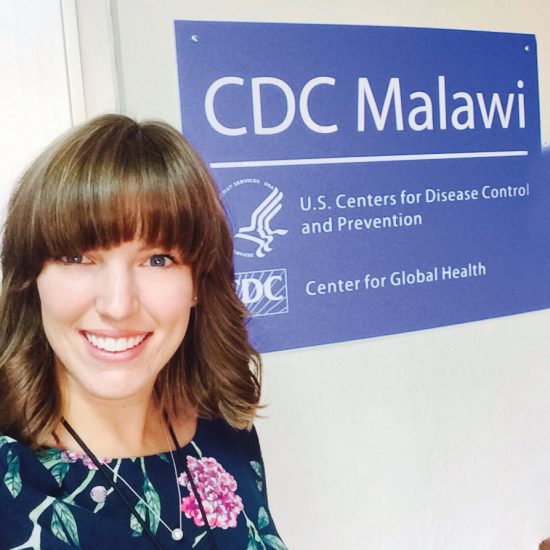On the Front Lines
 Fighting HIV/AIDS in Malawi
Fighting HIV/AIDS in Malawi
Malawi is a beautiful country, with picturesque mountain ranges and plateaus, vast parks and forest reserves filled with diverse wildlife, and the crystal clear waters of massive Lake Malawi along its eastern border. Its people are renowned for their hospitality and warmth, so much so that Malawi is called “the warm heart of Africa.”
In Africa’s warm heart, however, there is also a sad reality. Malawi is host to one of the highest rates of HIV prevalence in the world. An estimated 10.6 percent of the adult population is living with the disease, which is the leading cause of death in the country.
Jessica Sexton (‘15), a Master of Public Health graduate in epidemiology, lives and works in Llongwe, Malawi, a large, urban center where the epidemic is even more prevalent. She is an Allan Rosenfield Global Health Fellow with the Centers for Disease Control and Prevention (CDC). Sexton was one of only 30 students selected from more than 2,000 applicants from across the country, and began a one-year fellowship in August of 2015, only months after her graduation. She signed on for another year last August to continue her work in the field.
“They say the first year we learn and the second year we implement,” she said. “After one year, I couldn’t walk away. I wanted to be as effective as I could be.”
Sexton’s work with the CDC is focused on the HIV/AIDS epidemic, and on the many programs that target its infected populations. Such programs include Option B+, an initiative for all HIV-positive pregnant or breastfeeding women. It offers them lifesaving antiretroviral treatment for their entire lives in order to prevent mother-to-child transmission of the disease. Sexton and her team travel into the cities and villages on a quarterly basis for field visits to evaluate and strengthen programs to reach their treatment goals. “It’s one thing to read about it in the news, to see a report or to see a paper at a conference or something,” she said.
“It’s another to see these programs implemented firsthand, and to even be fortunate enough to play a role in that process.”
When she isn’t working at the CDC or traveling in the field, Sexton visits a nearby camp, housing refugees largely from the Democratic Republic of Congo. She tutors them and helps them with visa applications, and gives dance lessons, for which they help her with French in return. She says the experience and the people have given her a new perspective on the world.
“The thing that’s struck me is the resilience of these people,” she said. “A lot of these kids and adults have been through everything from genocide to having homes destroyed in the war, and they come here and they’re spinning silk. It’s just absolutely wonderful.”
Sexton is currently applying to doctoral programs back in the United States, hoping to finish her second year in Malawi and move straight into her Ph.D. After graduation, she hopes to join the United States Public Health Service Commission Corps, influencing public health on a national and international level.
After spending a year in the field, Sexton says she is thankful for her time in the Jiann-Ping Hsu College of Public Health. At Georgia Southern, she learned what it would take to reach her career goals from Isaac Fung, Ph.D., assistant professor of epidemiology, and she saw the international field first-hand in Ghana with Evans Afriyie-Gyawu, Ph.D., associate professor of environmental health.
And now, working on the front lines of a plague that is ravaging the African continent, all her experience is coming together.
“Every day it’s one person at a time, one day at a time,” she said. — Doy Cave
